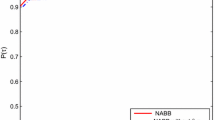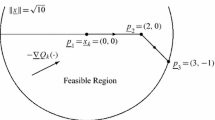Abstract.
UOBYQA is a new algorithm for general unconstrained optimization calculations, that takes account of the curvature of the objective function, F say, by forming quadratic models by interpolation. Therefore, because no first derivatives are required, each model is defined by ½(n+1)(n+2) values of F, where n is the number of variables, and the interpolation points must have the property that no nonzero quadratic polynomial vanishes at all of them. A typical iteration of the algorithm generates a new vector of variables, \(\widetilde{\underline{x}}\) t say, either by minimizing the quadratic model subject to a trust region bound, or by a procedure that should improve the accuracy of the model. Then usually F(\(\widetilde{\underline{x}}\) t ) is obtained, and one of the interpolation points is replaced by \(\widetilde{\underline{x}}\) t . Therefore the paper addresses the initial positions of the interpolation points, the adjustment of trust region radii, the calculation of \(\widetilde{\underline{x}}\) t in the two cases that have been mentioned, and the selection of the point to be replaced. Further, UOBYQA works with the Lagrange functions of the interpolation equations explicitly, so their coefficients are updated when an interpolation point is moved. The Lagrange functions assist the procedure that improves the model, and also they provide an estimate of the error of the quadratic approximation to F, which allows the algorithm to achieve a fast rate of convergence. These features are discussed and a summary of the algorithm is given. Finally, a Fortran implementation of UOBYQA is applied to several choices of F, in order to investigate accuracy, robustness in the presence of rounding errors, the effects of first derivative discontinuities, and the amount of work. The numerical results are very promising for n≤20, but larger values are problematical, because the routine work of an iteration is of fourth order in the number of variables.
Similar content being viewed by others
Author information
Authors and Affiliations
Additional information
Received: December 7, 2000 / Accepted: August 31, 2001¶Published online April 12, 2002
Rights and permissions
About this article
Cite this article
Powell, M. UOBYQA: unconstrained optimization by quadratic approximation. Math. Program. 92, 555–582 (2002). https://doi.org/10.1007/s101070100290
Issue Date:
DOI: https://doi.org/10.1007/s101070100290




